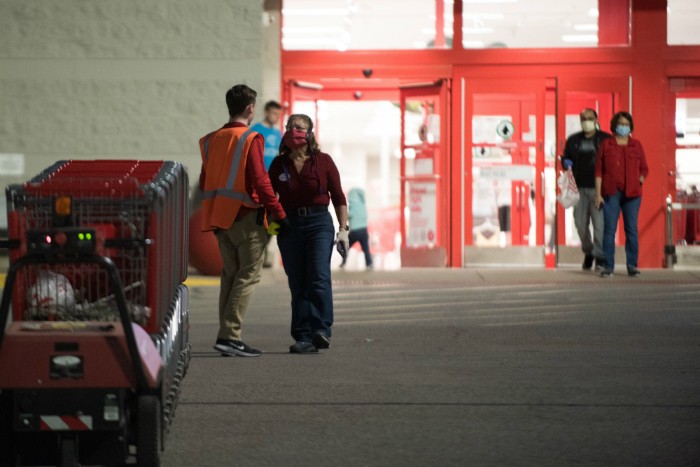Etta had only been working at Target for a short period of time when COVID-19 hit the St. Louis area.
Before landing the gig, she had been unemployed for a month after the retail store where she previously worked shuttered for good, and she was badly in need of a new job.
"I was desperate for anything, and I got hired on the spot," Etta says. "I was like, 'OK, cool. Target is a great company.' Then as the weeks went on, I thought, 'Should I even be doing this anymore?'"
Choosing to quit, though, hardly feels like a choice. She already has a second job to make ends meet, and she's not sure how much non-customer-facing work is available right now anyway. Like retail chains big and small across the U.S., Target recently gave employees a temporary pay bump amid COVID-19. The extra money is nice, Etta says, but it's hardly enough to ease the stress that comes with working in retail during a pandemic.
"The reality of it is every time I'm driving into work, I have anxiety," she says. "There's been days where I don't feel safe coming in. I'm getting paid $2 more an hour right now, so I'm making $15 an hour to risk my life every day."
In some states and cities across America — including Springfield, Missouri — local or state officials have requested that stores such as Target, Walmart and CostCo temporarily limit or bar the sale of nonessential products amid COVID-19. In early April, customers at Walmart locations in the Springfield area found signs posted around the stores stating that items in some departments and aisles were nonessential and therefore not currently for sale.
These kinds of restrictions make sense to Etta, who spends most of her six to eight hour shifts at Target in the clothing department. Despite the virus being easily transmitted on surfaces, Etta says that many customers are still shopping for clothing as they did before the pandemic.
"It should be roped off," she says of nonessential departments. "You can get by without that $5 T-shirt. Only pharmaceutical, grocery and toiletry — which we can't ever keep in stock anyways — [should be open]. And if you're not interested in buying it, don't put your hands on it. You don't have to go through and touch everything, which is what's happening."
Wearing a face mask she made herself, Etta says she spends most of her shifts folding and sorting clothes and picking up after customers. Target isn't currently requiring employees to wear face masks, and unlike area grocery stores, there is no plexiglass separating checklane workers from customers. Etta says her store has been vigilant about cleaning carts and conveyor belts, which is a source of comfort. (When reached for comment, a Target representative stated that the company isn't "currently coordinating interviews.")
"I made myself a mask cause I've got to do what I can to protect myself," Etta says. "It's still a job; I still have to show up. Maybe four of us are wearing masks; I think it should be mandatory. It's insane the amount of people that are in there to shop and like it's nothing."
David Cook at Local 655 agrees with Etta. Most Target workers aren't under union protection, but his union recently petitioned Missouri Governor Mike Parson to require that customers of all essential businesses wear face masks when shopping in essential retail stores. So far nothing official has come of that, but Cook continues to voice the message to his employers and through interviews with local media.
"Most of the retailers that I represent today, and a lot of the nonunion ones, are now providing some type of mask for their employees," Cook recently told St. Louis Public Radio. "And that's great — the mask protects the public from getting an infection from them — but nothing protects them from the public." (As part of a revamped stay-at-home order issued last week, St. Louis is now requiring essential businesses to provide appropriate personal protective equipment to employees.)
Etta has experienced plenty of compassionate and empathetic customers, she says, including many wearing masks and gloves in the store, and it makes the work a little easier. There are still plenty of customers who approach her and her co-workers with frustrations, though, especially when items are out of stock.
"Most people have been pretty understanding about it, knowing that it's hard to find that stuff anywhere, but then there's going to be that asshole who's like, 'Well, why can't you get it in?'" she says. "'Well, because the world is having a shortage.' It's just like, it's bigger than you. That's the frustration: The people who are just self centered and aren't seeing the bigger picture, about how many millions of people are affected by this."
For Steve, working at Whole Foods started as a second job. Amid COVID-19, though, it's become his main gig, although he hopes that isn't the case forever. His experience working retail during the pandemic has been different than many of his co-workers, as his department, prepared foods, has been pretty slow in recent weeks.
"I work in the prepared foods department, so the deli counter, pizza station and the sandwich and taco stations," he says. "I was doing that, and it was always usually pretty busy until this happened, and now it's pretty dead. I've been working at the pizza station a lot, and I make about one pizza a shift, and that's about it."
In his experience, Whole Foods management has done as much as possible to protect employees and customers at his store, including supplying workers with face masks and installing plexiglass dividers at each of the checklanes. Originally those dividers only extended the length of the checker station, but now they've been expanded across the conveyor belts.
Steve notes that employees who wear glasses have had a little difficulty wearing face masks for long shifts, as breathing while wearing them tends to fog up their lenses, but it's a small frustration to protect themselves and customers from exposure. He adds that cleaning and sanitizing has been kicked into overdrive, and recently, the store has started limiting the number of customers who can shop inside at one time.
Employees have received a temporary $2-an-hour raise for working during the pandemic; originally those raises were available through the end of April, but Steve guesses the timeline will be extended based on when the virus peaks in St. Louis. He adds that employees have been able to call out or take a leave of absence without any consequences, but that time off is unpaid. Still, having this option has allayed the anxieties of many of his co-workers, who he says have elected to stay at home for the time being. (When reached for comment, a Whole Foods representative said the company was "unable to accommodate an interview at this time.")
For Steve, these days, a normal shift involves a lot of cleaning — "our kitchen area has probably never been cleaner," he says — and monitoring the prepared foods cases.
"On the pizza station, I now package up all the pizza, whereas before I would just put it out and it was with a little spatula and it was self-serve," he says. "Now I box it up, and because you can't see it, there's people who just start going through the pizza, like opening it up to try and pick out the one they want, and then it's like, 'Well, every [box] you just opened I have to throw away now.'"
The pizza boxes are labeled, of course, but Steve thinks those types of customers just aren't approaching their grocery shopping with a different mentality during the pandemic.
That underlines one of the biggest risks that essential retail workers are facing right now: Even as management takes steps to keep employees and customers safe, there is little they can do about how customers comport themselves inside and outside the store. Steve says that he's noticed piles of gloves discarded in the Whole Foods parking lot — something all three retail workers interviewed for this story mentioned as a problem — which are, of course, then cleaned up by employees.
"If nobody picks it up, where do you think that's going to go?" he says. "It's a plastic glove. It's not going to just wash away."
Since his department has been slow, Steve says that management has asked him to start helping limit the number of customers who enter and exit the store. (In this case, 30 people at a time.) He's grateful to be busy and enjoys the work, adding that people have generally been understanding about the new restriction if not grateful for it.
Steve says he doesn't worry too much about contracting the virus, as he lives alone, but he fears for the safety of his family members, including his young nephews, during the pandemic. If his income at Whole Foods wasn't critical, he says he would likely stay home to protect himself, but it's just not financially feasible for him.
"I read on the internet the other day about how, you know, we're not really essential employees — we're more like captive employees," he says. "We took these jobs because we need the money and maybe we need the benefits, and we're not in a position to where we can quit. I'm going in because I have to go in. I'm not going in because I'm like, 'Oh, the people need food.' I'm not being self-sacrificing. I'm doing this 'cause I have to; if I had a choice, yeah, I'd probably just stay home, but I don't have that option."
Like Target, Whole Foods workers are not unionized. In recent years, Whole Foods employees have banded together under a group called Whole Workers to advocate for more protections for employees and encourage unionizing. Billionaire Jeff Bezos, the founder and CEO of Amazon, purchased Whole Foods in 2017 and has been taken to task by politicians such as U.S. senators Bernie Sanders and Elizabeth Warren for "potentially illegal anti-union behavior."
In an open letter released in 2018, the senators criticized Bezos for a leaked Whole Foods training video that directed team leaders to discourage unionization. Following the leak, Amazon and Whole Foods announced plans to raise the minimum wage for its employees to $15 an hour.
"Whole Foods's stated aim to 'set the standards of excellence for food retailers' and observation that 'our leaders think long term and don't sacrifice long-term value creation for short-term financial results' are in direct contradiction to what appears to be systematic incitement of supervisors violating workers' rights by illegally interfering with their organizing activities," the senators wrote.
In the St. Louis area, David Cook at Local 655 says that his union has heard unsettling stories about worker conditions at non-union stores, but because employees can't officially organize and bargain for protection, there could be variance in working conditions from store to store instead of chain to chain.
"We're hearing some horror stories, especially as it relates to Whole Foods, Trader Joe's, and not only here but across the country," Cook says. "Dollar General is another one that's really instituting what I call bad practices. We're trying to communicate with that [employee] population and let them know we're fighting for them, because I don't care if they're in my union or not."
Recently, Cook has been in touch with a group of non-union grocery workers called Who Are We to communicate a united message between his union with non-union employees regarding their shared concerns and goals. Founded by grocery store employee Chris Dean, the Who Are We movement is fighting to advocate for increased protections for essential retail workers amid COVID-19.
"We are risking our lives, and the Who Are We movement is here to let everybody know that that is not OK," Dean said in a recent interview with St. Louis Public Radio. "We deserve to live, and we deserve to be safe at work."








